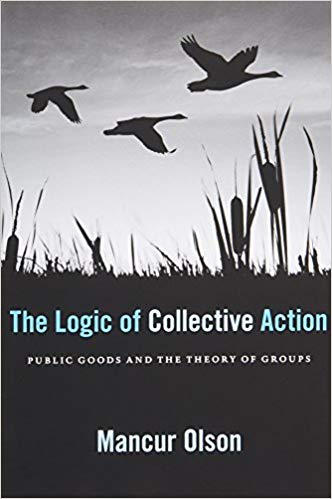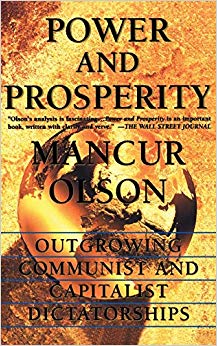Background
Mancur Olson was born on January 22, 1932, in Grand Forks, North Dakota, United States. He is the son of Mancur L. and Clara Lenore Olson.

1340 Administration Ave., Fargo, ND 58102, United States
North Dakota State University where Mancur Olson received a Bachelor of Science degree.
University College, Oxford OX1 4BH, United Kingdom
University College, Oxford where Mancur Olson received a Master of Arts degree.
Harvard University, Cambridge, MA 02138, United States
Harvard University where Mancur Olson received a Doctor of Philosophy degree.





(This book develops an original theory of group and organi...)
This book develops an original theory of group and organizational behavior that cuts across disciplinary lines and illustrates the theory with empirical and historical studies of particular organizations. Applying economic analysis to the subjects of the political scientist, sociologist, and economist, Mancur Olson examines the extent to which the individuals that share a common interest find it in their individual interest to bear the costs of the organizational effort. The theory shows that most organizations produce what the economist calls "public goods" - goods or services that are available to every member, whether or not he has borne any of the costs of providing them.
https://www.amazon.com/Logic-Collective-Action-Printing-Appendix/dp/0674537513/ref=sr_1_1?keywords=mancur+olson&qid=1576744359&sr=8-1
1965

(The years since World War II have seen rapid shifts in th...)
The years since World War II have seen rapid shifts in the relative positions of different countries and regions. Leading political economist Mancur Olson offers a new and compelling theory to explain these shifts in fortune and then tests his theory against evidence from many periods of history and many parts of the world.
https://www.amazon.com/Rise-Decline-Nations-Stagflation-Rigidities/dp/0300030797/ref=sr_1_2?keywords=mancur+olson&qid=1576744603&sr=8-2
1982

(Why do some economies do better than others? How does soc...)
Why do some economies do better than others? How does society encourage the kind of market economy that generates continually increasing incomes? How do particular styles of government affect economic performance? World-renowned economist Mancur Olson tackles these questions and others in what will surely be regarded as his magnum opus. Olson contends that governments can play an essential role in the development of markets. Reliable enforcement of private contracts and the protection of individual rights to property depend on governments strong enough not to undermine them. His exploration of "market-augmenting governments" will stand as a cutting-edge work on economic growth and provide a useful framework in which to consider the Asian financial crisis and its aftermath.
https://www.amazon.com/Power-Prosperity-Outgrowing-Capitalist-Dictatorships/dp/0465051960/ref=sr_1_3?keywords=mancur+olson&qid=1576744603&sr=8-3
1999
Mancur Olson was born on January 22, 1932, in Grand Forks, North Dakota, United States. He is the son of Mancur L. and Clara Lenore Olson.
Mancur Olson received a Bachelor of Science degree from North Dakota State University in 1954. In 1960 he received a Master of Arts degree from University College, Oxford. He also obtained a Doctor of Philosophy degree from Harvard University in 1963.
Mancur Olson began his career in 1960 as a lecturer at Princeton Univesity. From 1961 till 1963 he did his military service in the airforce. Then he came back to Princeton University where he took the position of a professor assistant till 1967. During the next two years, he worked as a deputy assistant secretary at the United States Department of Health, Education, and Welfare (now Department of Health and Human Services). He then joined the University of Maryland as an associate professor and became a professor of economics in 1970. From 1978 till the day of his death he remained as professor emeritus there. He also worked with the Center for Institutional Reform and the Informal Sector, which he helped establish in 1990, as a principal investigator. During his career, Olson served for a time as vice president of the American Economics Association.
Olson also wrote some books on economics. His most seminal work The Logic of Collective Action: Public Goods and the Theory of Groups was published in 1965. In it, Olson laid the foundation for free-riding behavior, created a taxonomy of groups, and extended the problems associated with collective action to a broad class of economic and non-economic phenomena. Olson wrote with simplicity and clarity. This work was so persuasive that several authors attributed the discovery of the free-rider problem to him. Others were more critical of his work. They argued against his claimed relationship between group size and the successful provision of collective goods; against the exploitation of large actors by small ones; and against the importance of selective incentives in the formation of groups. Some scholars even went so far as to claim that Logic was merely a popularization of earlier ideas.
He also wrote The Economics of Wartime Shortage (1961), which studied food shortages in wartime Britain; The Rise and Decline of Nations (1982), which dealt with "institutional sclerosis" caused by interest groups; and Power and Prosperity: Outgrowing Communist and Capitalist Dictatorships (1999), which described the formation of government from roving bandits to democracy. Olson contributed articles to some scholarly journals as well.
Mancur Olson is known for his contributions to institutional economics and to the role which private property, taxation, public goods, collective action, and contract rights play in economic development.
Olson is the recipient of the Gladys M. Kammerer Award from the American Political Science Association and an award from the Academy of Management in 1993. To honor Olson's many contributions, the American Political Science Association established the Olson Award for the best Ph.D. dissertation in Political Economy. In 2013 the University of Maryland announced the creation of a new endowed professorship - the Mancur Olson Professor of Economics.
(Why do some economies do better than others? How does soc...)
1999(This book develops an original theory of group and organi...)
1965(The years since World War II have seen rapid shifts in th...)
1982
Quotations:
"No analysis of the limits of economic freedom or the uses of coercion by government, labor unions, or organizations of any kind can do justice to the complexity of the subject without taking account of the distinction between collective and non-collective goods."
"The spontaneous individual optimization that drives the theories with which I began is important, but it is not enough by itself. If spontaneous Coase‐style bargains, whether through laissez-faire or political bargaining and government, eliminated socially wasteful predation and obtained the institutions that are needed for a thriving market economy, then there would not be so many grossly inefficient and poverty-stricken societies."
Mancur Olson was a member of the editorial board of the journal Public Choice, International Studies Quarterly, Science, and American Association for the Advancement of Science where he was later president of a section. He was a member and then vice-president of the American Economic Association, vice-chairman of Health Services Cost Review Commission of the State of Maryland, president of Public Choice Society and Eastern Economic Association. He was a fellow of Woodrow Wilson International Center for Scholars in 1974, Lehrman Institute in 1977, American Academy of Arts Sciences, a distinguished fellow of United States Institute of Peace in 1990-1991, and a fellow of University College, Oxford. Olson also was a member of the club Cosmos in Washington, D. C. as well.
vice-chairman
Health Services Cost Review Commission of the State of Maryland , United States
1971 - 1977
president
Southern Economic Association , United States
1981 - 1982
president
Public Choice Society , United States
1972 - 1974
member of the editorial board
American Association for the Advancement of Science , United States
1980 - 1981
president
Eastern Economic Association , United States
1993 - 1994
member of editorial boards
International Studies Quarterly
1980 - 1981
Mancur Olson married Alison Gilbert on August 29, 1959. The marriage produced three children, Ellika L.P., Mancur Severin, and Sander Brandt.
Alison Olson is an American educator, editor, and writer. She worked as an associate professor of history at Rutgers University and also was a professor of history at the University of Maryland. Olson is the author of Making the Empire Work: London and American Interest Groups, 1690-1790.
